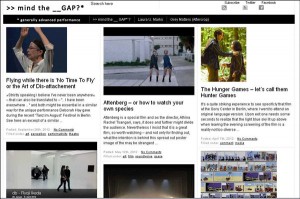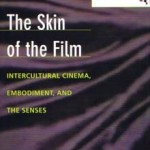>> mind the — GAP*? | since 2004 | Interview L.U.Marks | 2005

*generally advanced performance
Established in 2004 and since used as an online publishing and research tool.
In focus here is an interview 2005 with Laura U. Marks and consequently published texts.
— A footnote on the idea and concept of the website and blog please find below the pdf of the interview.

In November 2004 I got the opportunity to meet the curator and film theorist Laura U. Marks during the conference ‘Sense and Sensation – On the Performativity of Perception’ at the FU Berlin, section ‘Kulturen des Performativen’. The interview, that is accessible as a pdf below, was conducted during this period of her stay in Berlin.
L.U. Marks published The Skin of the Film: Intercultural Cinema, Embodiment, and the Senses (Duke University Press, 2000) and in 2002 Touch: Sensuous Theory and Multisensory Media (Minnesota University Press, 2002).
The Interview: Inherent Latency of Embodiment can be viewed and downloaded as pdfs below.
For a further introduction to her work and a text entitled – Approach via the ‘Smooth Space’ – Laura U.Marks’ Research on Intercultural New Media Practice please follow this link to the next page.
footnote on the website: There is no offline version here on this portfolio. For the online version please follow this link or go to www.mindgap.org.
The blog was originally set up under the premise of extended performative possibilities. It took the gap as the metaphor for the void / empty space which is necessary to have other things evolve
-> to get a ‘moving’ / streaming image – a changing image
-> thus the gap as the moment of free space, defining the closed ‘programmed’ space / the scripted space, which needs the break to get the next action running / the next character introduced -> bits, morse, pulse, flash, etc..
The gap as the underlining concept, as the line, basis from where things start to evolve.
The weblog as the initial starting point, as a liminal space*, a space of in-between real/virtual, private/public. The performative principles of staging and cinema set against each other.